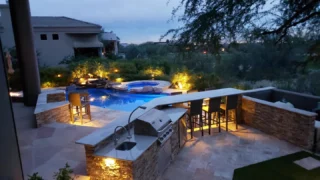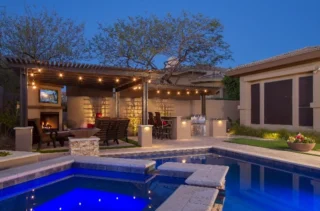The desire to transform a dull front yard into an inviting display or to create a stunning backyard for memorable gatherings takes center stage. Homeowners are thrilled to elevate their curb appeal or host legendary backyard gatherings with landscaping that reflects their personal style.
However, the logistics of the project start to creep in. How can homeowners achieve the gorgeous landscaping they crave?
New pavers, greenery, outdoor structures, and more are within reach when you have a better understanding about the landscaping industry. There are differences between landscaping designers and contractors that homeowners must know before beginning the process. Here’s some insight to the roles of these professions and what this means for your property.

What Are Landscape Designers?
Landscape designers specialize in creating aesthetically pleasing and functional outdoor spaces. They possess a keen eye for design and have a professional aptitude for horticulture, art, and architecture.
Their role involves conceptualizing and planning landscapes for a beautiful and practical space. They use their expertise to select appropriate plants, materials, and design elements that suit the client’s vision and the site’s unique characteristics.
Site Analysis
Site analysis is a critical first step for landscape designers, as it involves evaluating the specific conditions and characteristics of a given space. This process includes assessing the site’s topography, soil quality, climate, and existing vegetation.
Next, they’ll examine environmental factors such as drainage patterns, sunlight exposure, and microclimates that could influence plant selection and layout. By understanding how these elements interact, designers can create sustainable and functional outdoor spaces that thrive in their natural settings.
Conceptual Design
The client and landscape designers work closely together. Once a site analysis is complete, landscape designers craft a conceptual design. They translate client ideas into visual representations through detailed drawings, plans, and 3D renderings. These tools help clients envision the final outcome that adheres to their preferences and budget constraints.

What Are Landscape Contractors?
Landscape contractors handle the physical construction and installation of landscape designs. They possess technical skills in working with a variety of materials, equipment, and construction techniques.
The contractors will prepare the site, install hardscape features like patios and pathways, and plant trees, shrubs, and flowers. They understand soil conditions, drainage systems, and irrigation requirements.
Following the Design Plan
The contractor’s primary responsibility is to bring the designer’s vision to life. These professionals rely on the details of the design plan to install every component accurately. From the dimensions to the materials to the foliage, contractors follow the designer’s lead and create the installation plan from the instructions.
Site Preparation
Site preparation is a foundational task for landscape contractors. It involves clearing the area of debris, rocks, and existing vegetation. Following this, they level the ground, install drainage systems, and assess the soil quality for a successful landscape installation process.
Expertise – Landscape Designers
Aesthetic Principles
Landscape designers understand the principles of aesthetics. They know how to balance color, texture, and form to create visually appealing spaces. Their designs often incorporate symmetry, contrast, and harmony, making each element complement the other.
Horticultural Expertise
They possess extensive knowledge of plants and their growth habits. They understand which plants thrive in specific climates and soil conditions. This allows them to choose species that will flourish in the designed landscape, ensuring long-term success.
Environmental Considerations
Designers prioritize sustainable practices like incorporating native plants, water-efficient systems, and eco-friendly materials into their designs. This approach minimizes environmental impact and fosters biodiversity.
Client Collaboration
Effective communication with the client is essential for a comprehensive design. With each conversation, a cohesive design comes to life that reflects the client’s needs and preferences.
Education – Landscape Designers
This knowledge accumulates over time and with experience. Landscape designers go through a great deal of education to learn the ins and outs of the process.
Designers often hold degrees in landscape architecture or horticulture. Their education covers design principles, plant science, and environmental sustainability. They learn to use design software to create detailed plans and renderings.
Many also complete internships or apprenticeships to gain practical experience. Certification from professional organizations, like the Association of Professional Landscape Designers, increases their credibility.
Expertise – Landscape Contractors
Construction Techniques
Landscape contractors know how to build retaining walls, install irrigation systems, and lay pavers. Their technical skills ensure the structural integrity of each component.
Material Selection
While designers will come up with ideas, contractors know more about the properties of each material. Their knowledge about materials like stone, wood, concrete, and metal allows them to choose durable materials that suit the design and function.
Equipment Operation
Landscaping remodel projects require heavy machinery for execution. Contractors are proficient in operating equipment like excavators, loaders, and trenchers. They will meticulously prepare the site, precisely install each element, and overcome obstacles to provide clients with the results they desire.
Soil and Drainage
Every region presents different soil composition, while every yard presents disparate drainage qualities. Landscape contractors know how to amend soil to produce plant growth, prevent waterlogging, and restrict pooling water.
Project Management
Landscape contractors excel at coordinating tasks, managing labor, and overseeing timelines. Their organizational skills ensure the project progresses smoothly and meets deadlines.
Education – Landscape Contractors
Many landscape contractors start with on-the-job training while others will obtain bachelor’s degrees in landscape construction, horticulture, or engineering. They learn construction techniques, plant care, and equipment operation.
Apprenticeships offer the necessary hands-on experience to excel in this profession. Certification from organizations like the National Association of Landscape Professionals showcases their expertise.
Choose a Landscaping Company That Offers Design and Installation
The differences between landscape designers and contractors boil down to the stages of process. Nevertheless, both professions are essential to completing a landscaping project.
Most homeowners have to search for reputable landscape designers and contractors separately. Think Green provides a convenient solution. We offer landscape design services in Scottsdale as well as installation through our Production team.
This unique combination allows clients to enjoy the convenience of having all landscaping needs met at once. Working with a company that integrates both roles allows homeowners to streamline communication and project management. From initial design concepts through final installation, Think Green executes your vision flawlessly.




